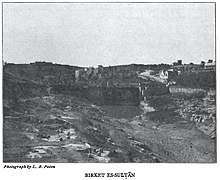Sultan's Pool
The Sultan's Pool (Hebrew: בריכת הסולטאן, Brechat HaSultan, Arabic: Birket es-Sultan) is an ancient water basin by the west side of Mount Zion, Jerusalem.
.jpg)
Sultan's pool, Jerusalem

Birket Sultan in 1907
History
The origins of the Sultan's Pool likely date to the time of Herod and some think it is the Snake pool mentioned by Josephus.[1] In Hasmonean times, water was fed into it via the lower aqueduct.[2] The Ottoman sultans (for whom the pool is named) enlarged it into a reservoir measuring 67 m × 169 m × 12 m. It was part of the water supply network for Jerusalem from antiquity to late Ottoman Empire times. During the Crusaders times, it was known as Lacus Germani.[3]
The Sultan's Pool is dry in summer and is used for concerts and festivals.[4]
gollark: Hold on, I can probably make a much nicer one.
gollark: It's kind of bad.
gollark: ```python#!/bin/env python3chars = [chr(n) for n in range(126)]firstchar = chars[0]lastchar = chars[len(chars) - 1]def increment_char(character): return chr(ord(character) + 1)def old_increment_string(string_to_increment): reversed_string = list(reversed(string_to_increment)) # Reverse the string for easier work. for rindex, char in enumerate(reversed_string): if char == lastchar: # If we can't increment this char further, try the next ones. reversed_string[rindex] = firstchar # Set the current char back to the first one. reversed_string[rindex + 1] = increment_char(reversed_string[rindex + 1]) # Increment the next one along. else: # We only want to increment ONE char, unless we need to "carry". reversed_string[rindex] = increment_char(reversed_string[rindex]) break return ''.join(list(reversed(reversed_string)))def increment_string(to_increment): reversed_string = list(to_increment) # Reverse the string for easier work. for rindex, char in enumerate(reversed_string): if char == lastchar: # If we can't increment this char further, try the next ones. reversed_string[rindex] = firstchar # Set the current char back to the first one. reversed_string[rindex + 1] = increment_char(reversed_string[rindex + 1]) # Increment the next one along. else: # We only want to increment ONE char, unless we need to "carry". reversed_string[rindex] = increment_char(reversed_string[rindex]) break return ''.join(list(reversed_string))def string_generator(): length = 0 while 1: length += 1 string = chars[0] * length while True: try: string = increment_string(string) except IndexError: # Incrementing has gone out of the char array, move onto next length break yield string```
gollark: Except it enumerates all possible ASCII strings instead.
gollark: I made that!
References
- "Sultan's pool". 2011-01-20.
- "An Archaeological Excavation in Jerusalem Has Revealed:This is How They Filled The Sultan's Pool With Water". 2009-06-16. Retrieved 2012-04-25.
- BIBLICAL RESEARCH. THE "LOWER POOL," JERUSALEM, The Independent, Volume 51, Issue 1, 1899
- "Go Jerusalem: The Sultan's pool".
| Wikimedia Commons has media related to Sultan's Pool. |
This article is issued from Wikipedia. The text is licensed under Creative Commons - Attribution - Sharealike. Additional terms may apply for the media files.